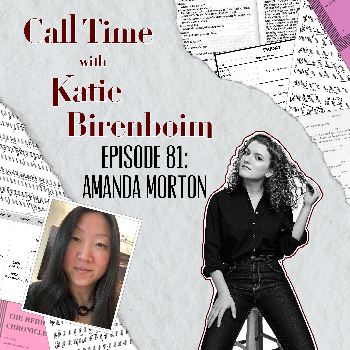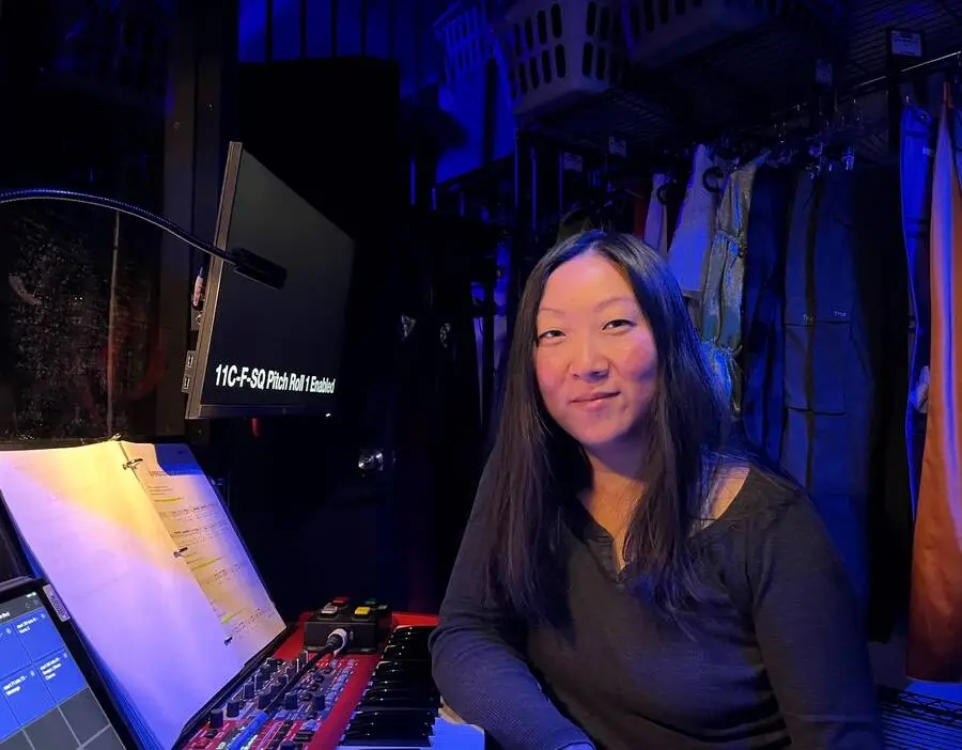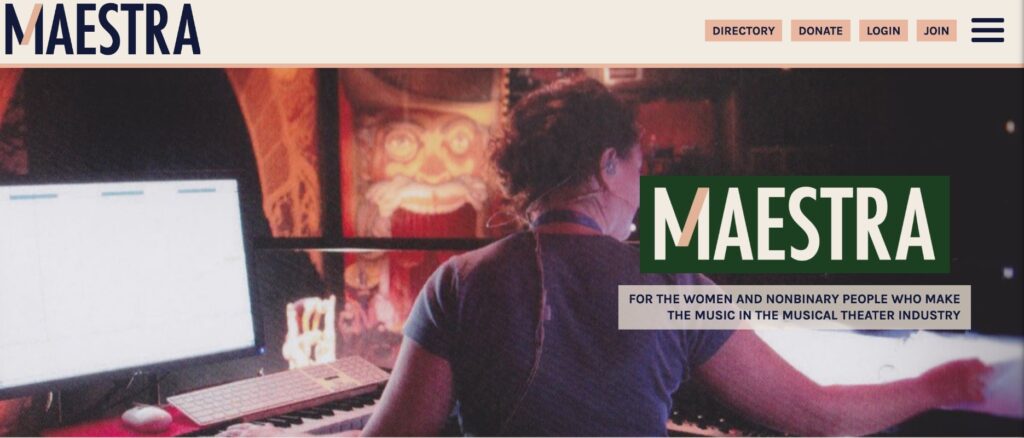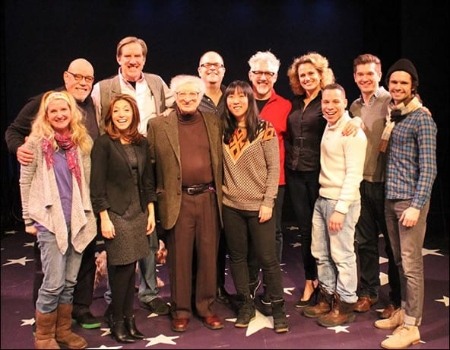
This week on the podcast I had the pleasure of interviewing music director, music supervisor, conductor, and pianist extraordinaire, fresh off a run as Associate Conductor/Keys 2 for Gutenberg! the Musical! and currently performing each night as Assistant Conductor/Keys 3 for The Who’s Tommy on Broadway, Amanda Morton.
Amanda and I met doing the Broadway-aimed workshop of Anne of Green Gables in January, and we were fast friends and colleagues. She is the type of person who is an immediate loud, proud, and passionate champion of other people, a quality that can be rare in this business, which may seem competitive to a fault. When you look at her social media, for example, nearly every other post of hers highlights or honors the achievements and contributions of others to her own career and the theatre industry at large. Amanda is most especially, in my experience, a champion of young women in the field. Indeed, we discuss on the show how her “slice” of the musical theatre world — specifically the “music” side of things — has been traditionally dominated by (white) men, perhaps even more so than other parts of the industry or even other parts of the traditional “creative team.” Amanda, who started as a performer (as so many of us do), talks on the podcast about making the decision to step away from performing and embrace her other, more musical skills, at least partially because “a little bit of reality set in about…how many API roles or Asian Pacific Islander roles actually existed in the world, the way that we [the industry] perceived who is capable of telling fully fleshed out emotional and psychological stories was different, and it has grown. And it’s so beautiful to see how things have advanced and how they continue to progress. But at that time, the opportunities were a little scarce and I didn’t have enough of the hunger to remain a performer.” Of course, she then went into a field where, at the time, there were perhaps even fewer opportunities for young, hungry, women, especially Asian Pacific Islander women. This perhaps explains Amanda’s dedication to the mentorship of young artists from under-represented groups today, as well as her somewhat unconventional career trajectory.
After graduating from college, and performing for a summer at the Edinburgh Fringe Festival — an experience Amanda refers to on the podcast as “idyllic” — Amanda balanced building her resumé as a music director and conductor here in the city with a “survival job” in the corporate world, working for a legal recruitment company. Ultimately, Amanda worked for that company for a total of five years, on and off, and she says resolutely on the podcast that she wouldn’t trade that experience for the world. She then moved to Philadelphia, making the commitment to fully devote her professional life to music and music direction, and it was there that she headed the Drama School at Arden Theatre Company, and made a “professional home” for herself at many other Philadelphia-based theatre companies, before returning to the “New York City scene.”
In Amanda’s own words, both of these experiences — working in the corporate world and “getting out of New York” — shaped her into the music director and leader that she is today. As I have discussed on the podcast before, and certainly discussed on Arts Journal, theatre is a unique professional field — in so many ways, but specifically in the sense that, often, it can still feel like we are just having fun with our friends. Some might argue that’s how it should always feel. As I say on the podcast, however, this sense of fun — what some might call informality — can also be somewhat dangerous for a work environment. In my opinion, taking some cues from the corporate world, in terms of leadership, worker protection, and even sometimes a sense of formality or protocol can be a plus within an industry or environment in which everything can feel so “loosey goosey.”
Amanda is far more articulate about this delicate balance than I: “Music is math and poetry,” Amanda tells me. “And I think that is required of the musical theater process. There is a mathematical element of time management and knowing when you have time abundance and when you have to move at different rates and being able to manage all those levers is very important [to] hold all of that in your mind. And, ultimately, I think when we provide structure for folks on a team, they have a very clear understanding of let’s just say what a day looks like and they feel supported by clear communication in that way. Then when they’re in that 20 minute session with the actor, they can fully throw their whole bodies into that because they’re not wondering what’s happening next and they’re not wondering what is the overarching musical goal we’re trying to achieve.” “So I think that you’re exactly right,” Amanda continues. By combining a “mathematical,” more structured, even “corporate” approach with the theatrical sense of fun, exuberance, laughter, and egalitarianism known to theatre, we can “facilitate an environment that feels loving and warm and human,” Amanda explains.

Similarly, Amanda recommends “spending time outside of New York City” to any “young folks” looking to make a career in theatre, especially in music direction and supervision. As discussed above, Amanda worked on and off in the corporate world to support herself while she was first living in New York City, and it was only when she moved to Philly that she, in her own words, became a “full time music director.” It was also where she started to work within the context of music education a great deal: she started to music direct at UArts, Temple, and Drexel, ultimately becoming the head of the drama school at Arden Theatre Company, as discussed above. Amanda, too, believes that these skills, in educating young people and shaping how they see, learn, and perceive music, are invaluable to her today. Everyone learns music differently, Amanda tells me on the podcast, and, likely because of her time at Arden, Temple, Drexel, and others, Amanda is deeply conscious of the best strategies to help actors learn a score, especially a difficult score, such that they can ultimately “sink into the joy” of singing/music rather than feel like they’re being “pinged by some new bit of information that’s giving [them] anxiety about learning.”
All of these experiences, within the corporate world, within music education, and beyond, perhaps explain why Amanda is such a strong leader of a room and such an unapologetic champion of young artists. Indeed, it also helps to explain her work with Maestra, an organization dedicated to uplifting and empowering women and nonbinary music directors, composers, and musicians within the musical theatre world, and MUSE, which stands for “musicians united for social equity,” and supports musicians that have been typically left out of the conversation, specifically people of color. If you do any research on Amanda, or talk to her for more than five seconds, you will understand that Amanda’s work with Maestra and MUSE is as important to her as her actual music direction and supervision credits. She sees that work as part and parcel of her career and the larger narrative of her life as an artist.

I’ve spoken a great deal about mentorship on the podcast and written about it in so many of my Arts Journal articles. But it was certainly the theme of my conversation with Amanda. Obviously, education is a kind of formalized mentorship. But even in our discussion of Amanda’s time in the corporate world, she credits so much of what she learned to the mentorship of Sang Lee, who ran the legal recruitment organization for which she worked and who hired her. It’s what immediately comes up when we talk about her work with Maestra and MUSE and the equity problems facing Broadway, specifically on the music side. With a lack of formalized structures — like those that exist in the corporate world, as discussed — it can be very difficult for young artists to gain the mentorship and guidance they need to succeed and rise in this business. Indeed, while Amanda talks about how she feels the industry is getting so much “better” when it comes to diversity, equity, and inclusion — she’s seeing “younger generations of women…being invited to…higher stakes scenarios earlier in their careers” — she says that many female colleagues of her generation still feel as if they missed out on the same kind of mentorship opportunities.
And it’s those that can really make or break you. It’s why Amanda loved her time working with the late, great Sheldon Harnick so much. I have a whole episode and article devoted to him, so the feeling is mutual, but Amanda had the rare opportunity, early in her career, to be mentored by him (after meeting and “vibing” when she worked on a York Theatre “Musicals in Mufti” spotlight on his notorious flop, The Body Beautiful, Harnick invited Amanda to help him with a new score on which he was working, an adaptation of the Moliere play, The Doctor In Spite of Himself).
“I think what was particularly resonant to me when we’re talking about mentorship,” Amanda says about why she thinks so immediately of Harnick when considering mentorship and guidance on Broadway, “is [that] I didn’t have any Broadway credits. I hadn’t played in any pits. I was in my late twenties…27, 28. And he having himself come from the early building blocks of musical theater, being mentored by Yip Harburg, but being the son of a cobbler…it was very organic and chill for him. It wasn’t about ‘who does this young person know? Are they in the network? Do they have a certain kind of resumé?’ He was just like, ‘no, we’re vibing. Do you want to do this thing?’ And so to feel a level of acceptance and visibility from this person who wielded so much power and strength in our industry…was really poignant to me.”

It’s an area where I think musical theatre can sometimes forget itself and become too formal (ah, here it might seem as if I’m contradicting myself, but I’ve always said it’s a BALANCE). Sometimes it feels as if the musical theatre market — and honestly that includes the nonprofit world — got too saturated with money such that everything now feels so high stakes. Producers, directors, casting directors, anybody in a position of power therefore yearn only for “a sure thing.”
The prevalence and power of musical theatre conservatories, and the highly specific way that they train young people, doesn’t help the situation either. As Amanda and I discuss on the podcast, it’s gotten to the point where it can feel like if you didn’t go to Michigan or Juilliard (if you’re an actor), or if you don’t know soenso and soenso (if you’re a producer), or if you don’t have this credential or that credential (if you’re a director…the list goes on), then no one in the industry will take you seriously, give you a chance, or certainly take the time to mentor you. Harnick, Amanda argues, was different. As I suggest on the podcast, perhaps that was because he was to some extent the last of his generation — a generation that was far more egalitarian, and willing to take chances, when it came to the business. You get the sense that, back in the day, if you had the talent and you had the gumption, you could be “on Broadway, baby.” Today, it seems to take a lot more, and a lot more contending with gatekeeping and credentialing, to get you there.
Amanda wants to be a mentor and a leader in the style of Sheldon Harnick — willing to take a chance, willing to TEACH, very little ego. It’s the kind of mentorship that, in my opinion, will actually make a dent on the industry, and actually help people from marginalized groups gain more of a foothold. I for one, as I say on the show, am so lucky and grateful to have so many amazing mentors, like Amanda, John Rando, and like my boss Jenn Thompson, who have modeled what it means to be strong, passionate, capable, precise, but kind, empathetic, and human leaders. That’s the kind of leadership that will change the industry, as discussed above, and the kind that, in my opinion, produces great work. You’ll have to go see for yourself.
Listen to my whole episode here, where we also discuss The Who, the iconic scream on the Phantom of the Opera soundtrack, rock and folk musicals, balancing family life and career, doing two shows at once, working with the orchestra vs. the cast, Amanda’s Pew Grant, and so much more. As always, let me know what you think, and please like, rate, and subscribe anywhere you listen to podcasts!


Leave a Reply